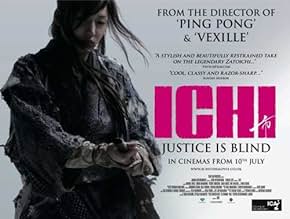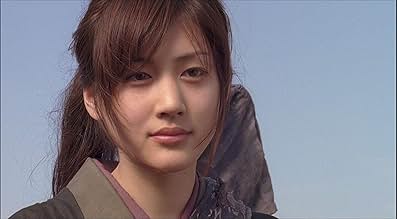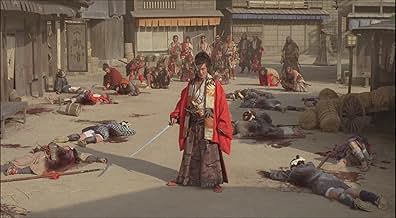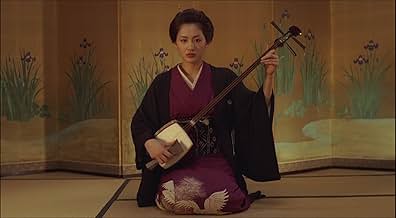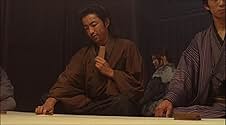AVALIAÇÃO DA IMDb
6,5/10
4 mil
SUA AVALIAÇÃO
Adicionar um enredo no seu idiomaIchi is a blind woman who roams about town with her shamisen (a three-stringed Japanese guitar), but she has exceptional sword skills with which she fights off yakuza and other villains.Ichi is a blind woman who roams about town with her shamisen (a three-stringed Japanese guitar), but she has exceptional sword skills with which she fights off yakuza and other villains.Ichi is a blind woman who roams about town with her shamisen (a three-stringed Japanese guitar), but she has exceptional sword skills with which she fights off yakuza and other villains.
- Prêmios
- 1 vitória no total
- Direção
- Roteiristas
- Elenco e equipe completos
- Produção, bilheteria e muito mais no IMDbPro
Enredo
Você sabia?
- CuriosidadesThe town in the movie is a Shukuba town. These towns were station towns along main roads in old days Japan. They mostly catered to people travelling along the main roads of Japan.
- ConexõesVersion of O Conto de Zatoichi (1962)
- Trilhas sonorasWill
Lyrics by Natsumi Kobayashi
Composed by Ryosuke "Dr.R" Sakai
Arrangement by Yoichiro Kakizaki
Performed by SunMin
Avaliação em destaque
Beset by tragic circumstances, often instigated due to her unfathomable beauty, the cruel fates bestowed upon her poignantly explored over the course of the feature, Ichi (the enthralling Haruka Aysae), a goze (a blind performer, who serenades people with her vocal talents and shamisen playing capabilities), with uniquely outstanding sword fighting skills, provided by a master she longs to discover, is forced to wander alone, after been accused of nefarious activity that was not of her own doing.
Set during an unidentified ancient period in Japanese history, the self-titled Ichi combines exceptional cinematography that wondrously captures the environments, while at the same time, the lavishly rich musical score heightens the beauty of the environments, and the poignancy of the horrible occurrences the leads are forced to endure. The bloody violence that accompanies the fight scenes is neither over the top, nor too little, and much like the rest of the feature, efficaciously encapsulates what can only be perceived as an accurately brutal portrayal of how cruel and barbaric, yet at the same time, vivid, life in this particular period could have been.
Touma (Takao Osawa) is a swordsman on a pilgrimage, and though he is capable of pretentiously boasting about his capabilities, he finds himself unable to draw his sword, for reasons that are conveyed over the course of the plot. The decision to not automatically reveal the back-story of the two leads brilliantly makes both characters mysterious and enchanting, as we hang on their journeys, in the hopes of discovering more about them, the depth provided to their characters been exceptionally orchestrated. Upon venturing into Ichi's life, she is forced to defend him against members of the villainous Ban-ki gang, their deaths spurring a vendetta, cast by their fellow members.
Led by the antagonistic Banki (Shido Nakamura), a once revered Samurai, past events left his face hideously scarred, though these afflictions are not nearly as grotesque as his mind, this man being turned into a lunatic warrior with a thirst for bloodshed, his violent origins having a direct link to Ichi, which is again further developed as the plot progresses. Accompanying Banki are a collection of equally violent men, one of whom being Izo (Riki Takeuchi), a fighter who proves to be almost as equally terrifying as his leader.
On their journey, Ichi and Touma come upon a town run by the Shirikawa's, a family consisting of Chobee (Akira Emoto) and his son, Toraji (Yosuke Kubozzuka), both of whom are members of the Yakuza, their township been plagued by continuous raids from the wretched Ban-ki gang, the local governmental personnel been unwilling to provide support. With the help of Kotaro (Ryosuke Shima), a young boy, Ichi is able to explore the town, during which she punishes members of the Ban-ki gang, Touma taking the credit for this particular brand of justice, which causes the town to hire him as their protector, unknowing that he is in fact incapable of providing the assistance they require, as the advances by the enemy continue to rapidly escalate.
As Ichi and Touma begin to spend more time together, a unanimous form of understanding and respect begins to grow between them, as the two traveling individuals discover they need each other for separate reasons. It ought to be noted, some of the sexual content in the film evolves around rape, and though I personally loathe films that use rape, or the threat of rape, as a form of entertainment, in the case of Ichi, this hideous act is used to not only realistically depict the horrors of the climate, but strengthens the sympathy we feel towards specific characters.
Although I have not previously witnessed the Zatoichi films this particular feature carries on from, so am unable to offer a comparative analysis, Ichi is a moving film with an equal amount of heart, brutality, character, depth and action, which elegantly and continuously captures the attention of its audience with the use of adventurous direction and poetic beauty.
Set during an unidentified ancient period in Japanese history, the self-titled Ichi combines exceptional cinematography that wondrously captures the environments, while at the same time, the lavishly rich musical score heightens the beauty of the environments, and the poignancy of the horrible occurrences the leads are forced to endure. The bloody violence that accompanies the fight scenes is neither over the top, nor too little, and much like the rest of the feature, efficaciously encapsulates what can only be perceived as an accurately brutal portrayal of how cruel and barbaric, yet at the same time, vivid, life in this particular period could have been.
Touma (Takao Osawa) is a swordsman on a pilgrimage, and though he is capable of pretentiously boasting about his capabilities, he finds himself unable to draw his sword, for reasons that are conveyed over the course of the plot. The decision to not automatically reveal the back-story of the two leads brilliantly makes both characters mysterious and enchanting, as we hang on their journeys, in the hopes of discovering more about them, the depth provided to their characters been exceptionally orchestrated. Upon venturing into Ichi's life, she is forced to defend him against members of the villainous Ban-ki gang, their deaths spurring a vendetta, cast by their fellow members.
Led by the antagonistic Banki (Shido Nakamura), a once revered Samurai, past events left his face hideously scarred, though these afflictions are not nearly as grotesque as his mind, this man being turned into a lunatic warrior with a thirst for bloodshed, his violent origins having a direct link to Ichi, which is again further developed as the plot progresses. Accompanying Banki are a collection of equally violent men, one of whom being Izo (Riki Takeuchi), a fighter who proves to be almost as equally terrifying as his leader.
On their journey, Ichi and Touma come upon a town run by the Shirikawa's, a family consisting of Chobee (Akira Emoto) and his son, Toraji (Yosuke Kubozzuka), both of whom are members of the Yakuza, their township been plagued by continuous raids from the wretched Ban-ki gang, the local governmental personnel been unwilling to provide support. With the help of Kotaro (Ryosuke Shima), a young boy, Ichi is able to explore the town, during which she punishes members of the Ban-ki gang, Touma taking the credit for this particular brand of justice, which causes the town to hire him as their protector, unknowing that he is in fact incapable of providing the assistance they require, as the advances by the enemy continue to rapidly escalate.
As Ichi and Touma begin to spend more time together, a unanimous form of understanding and respect begins to grow between them, as the two traveling individuals discover they need each other for separate reasons. It ought to be noted, some of the sexual content in the film evolves around rape, and though I personally loathe films that use rape, or the threat of rape, as a form of entertainment, in the case of Ichi, this hideous act is used to not only realistically depict the horrors of the climate, but strengthens the sympathy we feel towards specific characters.
Although I have not previously witnessed the Zatoichi films this particular feature carries on from, so am unable to offer a comparative analysis, Ichi is a moving film with an equal amount of heart, brutality, character, depth and action, which elegantly and continuously captures the attention of its audience with the use of adventurous direction and poetic beauty.
- totalovrdose
- 4 de jun. de 2015
- Link permanente
Principais escolhas
Faça login para avaliar e ver a lista de recomendações personalizadas
- How long is Ichi?Fornecido pela Alexa
Detalhes
- Data de lançamento
- País de origem
- Centrais de atendimento oficiais
- Idioma
- Também conhecido como
- 盲劍
- Locações de filme
- Empresas de produção
- Consulte mais créditos da empresa na IMDbPro
Bilheteria
- Faturamento bruto mundial
- US$ 4.382.564
- Tempo de duração2 horas
- Cor
- Mixagem de som
- Proporção
- 1.85 : 1
Contribua para esta página
Sugerir uma alteração ou adicionar conteúdo ausente




